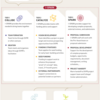Who manages I-SPARK?
This program will be housed in the OVPR Research Development Office, although certain aspects will require support from college business administrators, the Pre Award Office, and the Post Award Office.
It is programmatically linked to the new Faculty Development and Collaboration (FDC) Hub being developed by Faculty Affairs. The strategy aims to provide a "one stop shop" for faculty across disciplines to come explore collaborations from academic programs to research to community programs.
Why was I-SPARK established?
In contrast to traditional single investigator awards, interdisciplinary projects and programs are more complicated to manage from proposal development to closeout. To help facilitate this process, I-SPARK was developed to facilitate and support interdisciplinary teams.
What are the goals of I-SPARK?
This program seeks to support interdisciplinary teams by establishing the following goals:
- Support and facilitate the formation of interdisciplinary teams across the university.
- Support these teams in sharpening and refining their collective vision.
- Prospect external funding sources appropriate for their vision.
- Support proposal development and submission.
- Support management of the funded program.


